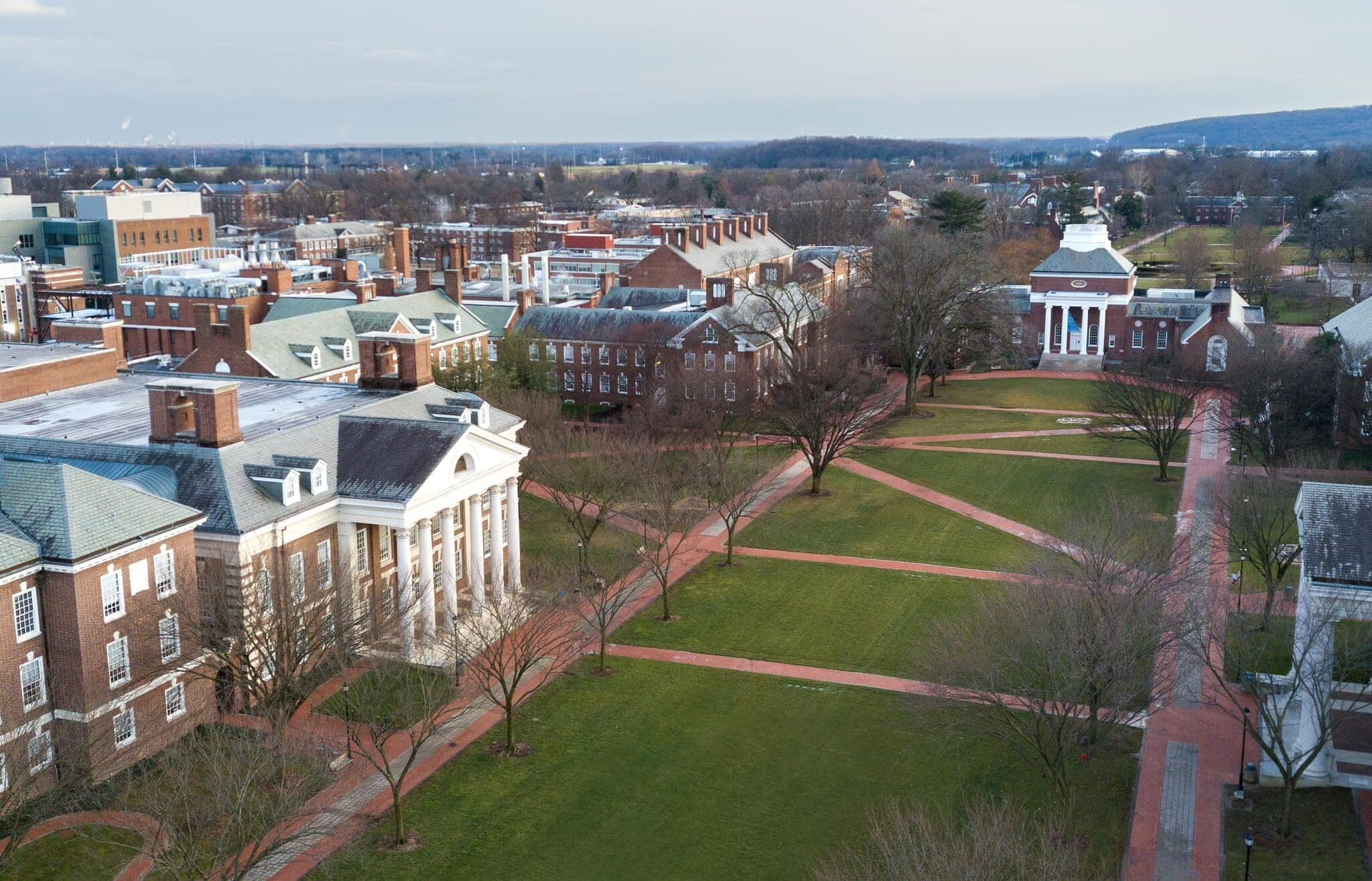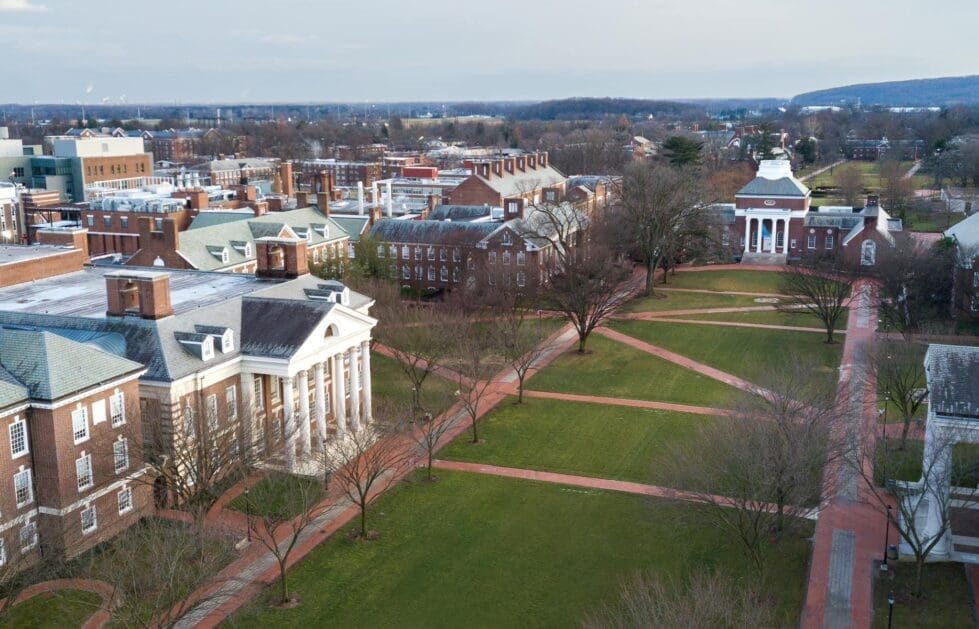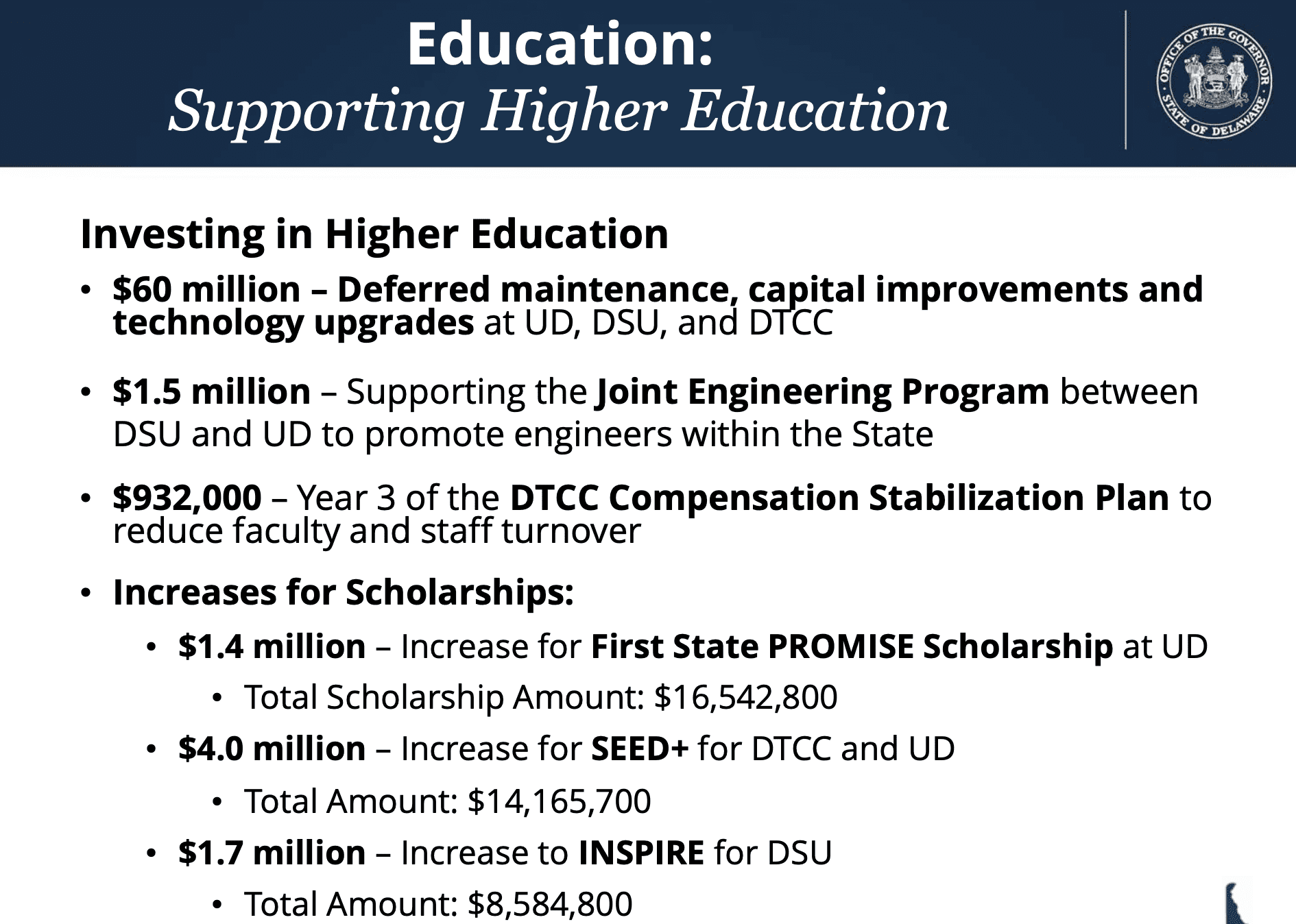

Three state colleges asked for millions of dollars in funding to them in next year’s budget. (University of Delaware Facebook)
Funding requests from three state colleges in General Assembly financial hearings Thursday drew questions about campus safety, fair pay and transparency.
Collectively, Delaware Technical Community College, Delaware State University and University of Delaware asked the state Joint Finance Committee for $32,534,000 for Fiscal Year 2024, which starts July 1.
The committee, made of members of both the state House and Senate, decides what will be in the state budget presented to the full legislature in June. It holds hearings with dozens of agencies throughout February.
Gov. John Carney’s proposed 2024 budget for higher education includes:
• $60 million – Deferred maintenance, capital improvements and technology upgrades at UD, DSU, and DelTech
• $1.5 million –Joint Engineering Program between DSU and UD
• $932,000 – Year 3 of the DelTech Compensation Stabilization Plan to reduce faculty and staff turnover
• $1.4 million – Increase for First State PROMISE Scholarship at UD, with total scholarship amount of $16,542,800
• $4 million – Increase for SEED+ for DelTech and UD for total amount of $14,165,700
• $1.7 million – Increase to INSPIRE scholarship for DSU, for total amount of $8,584,800
Here’s what UD, DSU and DelTech asked the JFC for, and what committee members and the public wanted to know before a check is written.
Delaware Technical Community College
Several committee members slammed Del Tech President Mark Brainard for salary disparities and a deteriorating work environment.
“The top eight positions, not including yours, Mr. President, comes to $1.2 million for eight people,” said Sen. Dave Lawson, R-Marydel. “Is that justifiable?”
Brainard said the average salary for a professor is between $50,000 and $60,000 and said it’s the call of the committee to determine if the wage discrepancies were fair.
Lawson pointed out that Brainard makes $274,000, about 400% more than the average professor.
“The board voted to give you a 25% raise in one fell swoop and your employees got maybe a 3% increase,” he said. “I just don’t understand how you’re in it for the students but yet the folks who have direct contact with the students are making 50 to 60k. The top seems awfully heavy.”
Lawson also asked Brainard if he was aware that a couple of professors felt they had been run out of the college because they tried unionizing.
“I think that’s a fantasy,” Brainard responded. He would be the first to know if professors were looking to unionize, he said.
“Are you really going to sit there and say you don’t know,” Lawson pushed back. He said several staff members have told him they aren’t happy with the working conditions.
“If I knew about a union effort, I would tell you who’s starting a union,” Brainard said.
Lawson repeated that the organizers were gone.
Rep. Ruth Briggs King, R-Georgetown, said it’s concerning that only 43% of staff members filled out a survey about the climate of the school.
“What I hear comes from emails, phone calls and other employees,” she said. They have told her that they are not happy with the results.
Brainard said the results weren’t shocking.
“We sent out multiple emails and tried to get participation,” he said, “We took that last summer at a time when salaries and compensation were at issue.”
That’s a bad participation rate, Briggs King said. The college is responsible for figuring out ways to increase participation and make sure there’s a positive school climate for staff, she said.
“Are things getting hostile there, because I have complaint after complaint of there being a hostile environment there and then a lot of people have left because of it,” Lawson said.
Brainard said this assessment is inaccurate and unfair.
“We have a pretty open environment and work climate at Delaware Tech,” he said. “It is a great place to work, and if there are two or three outliers who think that their voice isn’t heard…that’s not worthy of even considering.”
Briggs King also said the school needs more certified translators.
“For instance, our hospitals and certain others that provide services must have a translator and it has to be certified translator,” she said. “I didn’t know if any efforts have been made towards having translator certificate programs.”
Brainard said they have English as a second language programs, which Briggs King pointed out is not the same.
What DelTech is asking for:
Brainard said repeatedly that DelTech needs help on deferred maintenance.
Delaware has already provided $50 million for Del Tech to address their building needs, but that money runs out at the end of next year.
Brainard requested assistance for the remaining $50 million the school still has in deferred costs.
For Fiscal Year 2024, Del Tech is asking for $19,815,400 for critical capital needs and deferred maintenance, $3.5 million for minor capital improvements, $300,000 for technology and $1.2 million for expanding the parking garage on its Wilmington campus.
That adds up to $24,815,400 for Fiscal Year 2024.
In Fiscal Year 2025, the college is seeking $20,733,900 to address critical capital needs and deferred maintenance, $3.5 million for minor capital improvements, $300,000 for technology and $3,994,800 million for expanding the parking garage on its Wilmington campus.
That would cost the state $28,568,700 in Fiscal Year 2025.
Del Tech also is requesting $23,330,500 from the state for Fiscal Year 2026. It plans to use $19,530,500 for critical capital needs and deferred maintenance, $3.5 million for minor capital improvements and $300,000 for technology.
Brainard wants the state to fully fund its healthcare center positions, which he says will help alleviate the nursing shortage in the state.
He’s also looking for funding to complete a comprehensive employee compensation plan.
He did not mention costs of the healthcare or compensation requests.
Some of the major projects Del Tech is working on include finishing the Allied Health Center for Excellence, the Stanton Child Development Center and the Stanton Culinary Building.
Delaware State University
President Tony Allen drew mostly praise for elevating DSU to the second best public HBCU in the nation.
However, several public commenters brought up campus concerns.
Micaih Lloyd, a DSU freshman, said the school is using financial resources to expand rather than get the students the resources they need and deserve.
“We have four counselors for a little over 6,000 students, so that’s 1,500 students per counselor,” he said. “We only have 30 to 33 (police) officers.”
They should have body cameras, he said, but was told by the campus police chief that the school simply did not have the funds to buy them.
Lloyd said an administrator told him that $200,000 is mysteriously missing from the school’s financial aid fund and no one can account for it.
“There needs to be funding set aside for water filtration systems for our showerheads,” Lloyd said. “I was admitted into the hospital over this past week due to a body rash, and several other students came forward about the same concern.”
These concerns have not been addressed, he said.
He called for an audit before the state gives DSU any more money.
“I’d like to respectfully request that a federal auditor come in and go over the financial aspect of the university to not only find out where unaccounted money is, but make sure the funds are being used properly,” he said.
DSU also doesn’t do enough to support victims of rape, he added.
“We do not have enough funding for resources to assist sexual assault survivors and an administrator from our school informed me that the reason is a federally funded program designed to advocate for survivors was removed from the university,” he said.
Sophomore Melanie Jimmerson agreed that DSU doesn’t do enough to keep its students safe.
The main and downtown campuses need more protection to ensure the success of the school, she said.
She called for DSU to request state funding to hire trauma specialists.
“We need trained specialists, not counselors, not mental health therapists but trained specialists for trauma,” she said. “We need to have professionals who can actually allow for the students to maintain their studies and continue to go through their education and not transfer because of certain issues.”
One mother, who has two children attending DSU, said her daughter was raped and dozens of emails and calls to school administrators brought no help or emotional support for her daughter.
“I know that the staff members are not directly responsible for what happened to my child but you guys have to be responsible for seeing that she gets justice,” she said. “She was a virgin when she came here, and that first day here on campus, she was raped.”
Later in the hearing, Allen acknowledged that crime on campus is something that needs to be addressed.
According to DSU’s school newspaper, there have been five sexual assault cases involving DSU students since the start of the 2023-2024 school year.
What DSU is asking for:
Allen asked the committee for $630,000 for the school’s nursing program, which has grown from 327 students to 577 in the past five years.
“We are continuing to expand so that really means that as we get reaccredited we have to make sure that we’re keeping up with our full time professors and faculty that are teaching those students,” Allen said.
He’d like to have 100+ graduate students by 2026 and add six faculty and staff positions.
Allen also requested $532,000 to support DSU’s aviation program, which will help create a multi-cohort model to produce more pilots by adding six faculty and staff members.
DSU asked for $952,500 to expand their Center for Disabilities. The school has six times more students utilizing those resources than it did in 2020, he said.
To create a master’s in clinical psychology, DSU is asking for $523,500 from the state. To accredit Delaware’s only master’s in occupational therapy program, it’s asking for $657,400.
Allen also asked the committee for $982,500 to create a 3+2 dual-degree engineering program with the University of Delaware.
“That affords students in a couple of our majors – computer science, physics, chemistry, engineering physics – to have a relationship where they’re spending three years with Delaware State University, two years with University of Delaware and they come out with dual degrees, one of which will be the engineering degree,” he said.
Allen also requested $270,000 to increase salaries for academic advisors to address retention strategies.
That totals $5,118,600 for Fiscal Year 2024.
University of Delaware
President Dennis Assanis told the committee that the University of Delaware is helping to solve the state’s pressing teacher shortage.
“Our teacher residency program, which is now in its fourth year, provides a year-long paid posting in Delaware public high school,” he said. “So far, 55 students have completed the program.”
More than 80% of Delaware residents who graduate with an education degree stay in the state to teach, he said.
Lawson once again questioned the president’s salary.
“Would you be willing to share your salary with us?” he said.
Assanis opted not to, to which Lawson pointed out that he has records of it once being $1.5 million.
“I’m not trying to demean in any way, shape or form,” Lawson said. “I’m trying to answer taxpayers’ questions and these are the ones that I get.”
Lawson brought up how UD is storing 2,000 boxes of documents and millions of gigabytes of electronic information for President Biden.
The Republican senator said he wanted to make sure that state funding was not being used for UD’s security measures to make sure all of that information is properly stored.
Assanis assured him the money they use to protect those files are all from private funds.
“If the FBI would reach out to you, how would you respond as far as who’s maintaining it and who’s paying it?” Lawson said. “Will your response still be that it’s privately funded?”
Yes, Assanis said.
“If the FBI ever were to, you know, want to do anything, we would always cooperate with the federal agencies, of course,” Assanis said, “and will continue to pay for it with private funds.”
What UD is asking for:
The university is requesting $2.6 million from the state for Fiscal Year 2024. That would be on top of the $4.9 million that Gov. John Carney recommended last week to go towards the program.
This will support the First State Promise program which covers all tuition for students whose families earn $75,000 or less.
“This program helps keep more Delawareans here for their education and allows them to graduate with little or no debt,” Assanis said.
He also asked the committee to support Gov. Carney’s recommendation for an allocation of $1.5 million in Fiscal Year 2024 for UD and Delaware State.
“This will help our institutions provide faculty position support programs, joint mentoring, seminar courses and tuition assistance.”
Gov. Carney’s recommended budget includes:


Raised in Doylestown, Pennsylvania, Jarek earned a B.A. in journalism and a B.A. in political science from Temple University in 2021. After running CNN’s Michael Smerconish’s YouTube channel, Jarek became a reporter for the Bucks County Herald before joining Delaware LIVE News.
Jarek can be reached by email at [email protected] or by phone at (215) 450-9982. Follow him on Twitter @jarekrutz and on LinkedIn
Share this Post









